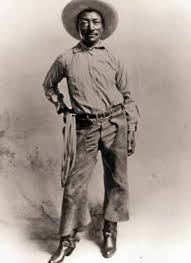On May 4, 1897, inventor J.H. Smith, an African American innovator, was awarded U.S. Patent No. 581,785 for a rotary lawn sprinkler. Smith’s invention improved the even distribution of water across lawns and gardens, using a rotating nozzle to deliver consistent pressure. His design helped shape the modern irrigation systems used in residential and agricultural landscaping today. Smith’s achievement reflects the often-overlooked contributions of Black inventors to everyday conveniences and technological advancement during the late 19th century.

On May 3, 1896, African American cowboy Bill Pickett became widely recognized as the inventor of bulldogging—a daring rodeo technique where a rider leaps from a horse to wrestle a steer to the ground. Inspired by how trained bulldogs helped catch stray cattle, Pickett adapted the method using his own skill and grit. His version included a now-retired tactic of biting the steer’s upper lip while pulling it off balance—a dramatic move that amazed crowds across the Wild West and helped shape modern steer wrestling in rodeos. Pickett toured with the Miller Brothers’ 101 Ranch Wild West Show and became one of the first Black cowboys to gain national fame. His legacy lives on as a trailblazer in both rodeo sports and African American frontier history.
On May 4, 1961, thirteen courageous civil rights activists—seven Black and six white—departed Washington, D.C., on Greyhound and Trailways buses to challenge segregated bus terminals across the American South. Known as the Freedom Riders, they tested the Supreme Court’s decision in Boynton v. Virginia (1960), which outlawed segregation in interstate bus and rail travel.
Organized by the Congress of Racial Equality (CORE), the riders faced threats, mob violence, and arrests as they journeyed through Virginia, the Carolinas, Georgia, Alabama, and Mississippi. Their bravery sparked a national movement and drew international attention to the injustices of Jim Crow segregation, ultimately pressuring the federal government to enforce desegregation laws more strictly.
On May 4, 1891, Dr. Daniel Hale Williams founded Provident Hospital and Training School in Chicago, Illinois—the first interracial hospital in the United States. At a time when African Americans were often denied treatment at white hospitals, Dr. Williams created a facility where Black patients could receive quality care and where Black medical professionals could train and work. Provident not only offered lifesaving services, but it also became a pioneering institution for nursing and surgical education. Just two years later, Dr. Williams would perform one of the first successful open-heart surgeries at this very hospital, cementing both his and the institution’s place in medical history.
On May 4, 1864, General Ulysses S. Grant launched the Overland Campaign by crossing the Rapidan River, initiating a fierce and prolonged duel with Confederate General Robert E. Lee. While Grant’s main forces engaged Lee in the bloody Wilderness battles, a lesser-known but critical front was unfolding under Major General Benjamin Butler. Commanding the Army of the James, Butler included nearly 1,800 Black cavalrymen and multiple regiments of Black infantry. Though often sidelined in historical accounts, these soldiers—many formerly enslaved—played a pivotal role in seizing key Confederate positions and disrupting supply lines. Butler, a vocal advocate for Black troops, gave them front-line responsibilities and publicly praised their valor, further validating their place in the Union war effort.
© 2025 KnowThyHistory.com. Know Thy History